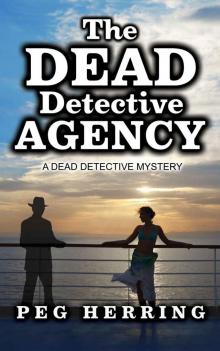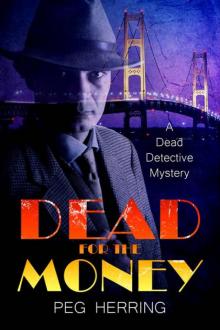- Home
- Peg Herring
The Dead Detective Agency (The Dead Detective Mysteries) Page 4
The Dead Detective Agency (The Dead Detective Mysteries) Read online
Page 4
Madison didn’t contradict him, but he doubted the assumption was correct. Tori’s murder did not stem from passion or twisted lust. It had been quick, deliberate, and emotionless. While it was possible a lover had ordered her death, he hadn’t carried it out.
The next interview was with James Falk, one of three brokers at PLK who were not partners. Falk was the opposite of Kellerman: subdued, smallish in build, and quiet-spoken. Although at least ten years younger, Falk lacked Kellerman’s vitality and seemed older. Madison sensed an intelligence that was deep but probably narrow. He could picture Falk providing at a moment’s notice an assessment of the profits a client would make from option A or option B, but he probably wouldn’t recognize half the names on the spines of the books found in Tori Van Camp’s apartment.
Falk was personally fastidious, his conservative clothing carefully fitted and perfectly neat. He had none of the average person’s nervous gestures, no need to straighten his tie or adjust his jacket. Madison saw immediately what Jennise Bowdlin had meant when she said he was difficult to please. A perfectionist who expected others to be perfect as well. For many, the boss from hell.
After the preliminaries, Madison asked what he knew about Tori Van Camp that might advance the investigation. Falk considered carefully before answering, probably his unfailing practice.
“I’ve tried to think what might shed light on the crime, but there was nothing the least bit mysterious about Tori. She was competent and well-liked, not in the least flighty or intrusive. In fact, I’d encouraged her to take college courses in order to move up in the world.” A tightening of the lips revealed Falk’s opinion that a career as a personal assistant was a waste.
“Tori was as honest as anyone I’ve ever known. I can’t see her involved in illicit affairs or consorting with criminals.” Falk shook his head regretfully. “You won’t find anyone who’ll say a bad word about her.”
Not now, anyway, Madison thought. “Anyone here she associated with outside what you would consider usual?”
Again the man gave it serious thought, brushing an imaginary speck of dust from the tabletop. “She was friends with Carmon, but you’ve spoken with her. I never saw a sign anyone else was special to Tori, but we didn’t talk much about personal matters. I’m—” Falk hesitated then gave a grim smile, reciting as if he’d been told but hadn’t absorbed it, “I’m difficult to work for. Some see my determination to obtain the best possible results for my clients as overzealous.”
“I understand.” Madison himself had been told the same thing.
Falk finally showed some humanity, unconsciously massaging the frown line that stood starkly between his dark eyebrows. “Tori didn’t let it bother her. She did her job, and when there was a problem, she didn’t take the criticism personally. We worked well together.” He paused for a moment and added candidly, “I admit I demanded a lot from her.” He smiled ruefully. “She’d have been my last assistant.”
“What do you mean by that?”
“I’m retiring at the end of the month.”
“Then I guess congratulations are in order.”
Falk made a small, dismissive gesture. “Not my choice. My doctors insist.”
“Sorry to hear it.” Madison noted the man looked pale, but he certainly wasn’t overweight, and it was a sure bet he didn’t smoke. “This line of work must be stressful.”
“I used to thrive on it, but I’ve had to cut back,” Falk admitted. Like many whose lives are abruptly interrupted by the medical world, he felt compelled to provide details. “I’m on a restricted diet. Lately, I have seen more doctors in a month than most people see in a decade. I ride some demented therapist’s idea of an exercise machine three days a week and carry nitroglycerin in case I start feeling ill again. It’s more than enough to scare a man to Albuquerque.” He glanced through the doorway to the bustle in the office as if trying to picture it without him there to make it tick.
A workaholic. He’ll probably die within six months of his retirement date. Madison paused briefly in polite acknowledgment of Falk’s situation before returning to his reason for being there. “Is there anyone who might know about Miss Van Camp’s private life, other than Miss Calley?”
Falk considered. “I saw her in here a couple of times talking with Abe Gougeon, our part-time intern. Abe’s a college student—well, not anymore. He received his degree recently.” Falk’s eyes lit with a memory. “In fact, that’s what he and Tori spoke of the last time I saw them together. Abe was telling her he might be making decent money for a change.”
“Will he be working at PLK full time now?”
“That remains to be seen. Mr. Pollard has been quite ill, and many things have been left pending.” Falk’s tone betrayed slight resentment at the inefficiency of it.
“I see. But this Abe knew Tori Van Camp well?”
Falk raised his eyebrows and shrugged. “Who listens to office gossip? But Abe’s a sharp one. If there’s a way to gain an advantage with a pretty girl, he’d find it.”
A few minutes later Abe Gougeon sat in the break room opposite Madison, looking uncomfortable and vaguely ill. He had dressed carefully that morning: the tie was well chosen, the shirt crisp and brilliantly white. Highly polished shoes showed as he moved restlessly in the swivel chair. Whatever upset him came after he had dressed for work.
Gougeon had short brown hair, almost green eyes with just enough brown in the iris to make hazel more accurate, and a face Madison would call all-American, not storybook handsome but well-proportioned, with strong bones beneath that would support his youthful look well into middle age. Was he always unable to sit still? “I understand you recently completed your education.”
“I have my degree, if that’s what you mean.” Gougeon grimaced. “I still have to pass my Series 7 and a bunch of other tests to demonstrate I am qualified to handle our clients’ finances. My education continues, just on a different level.”
“I see. How well did you know Tori Van Camp?”
Gougeon frowned at the sudden turn of subject but recovered quickly. “Not too well. We joked around like people do, but I never saw her outside of work.”
“She ever mention a special closeness with any one?”
The guy bit his lip as he considered the question. “Carmon and Tori were friends, but otherwise I can’t think of anyone.”
“How did you come to work at PLK, Mr. Gougeon?”
The young man spread his hands in an I-don’t-know gesture. “Mostly luck, I guess. I’ve worked hard to show them I appreciate the opportunity.”
“And you never asked Miss Van Camp out?”
A pause. “No. Why do you ask?”
Madison shrugged. “She was an attractive woman. You worked with her every day. It just seemed possible you might have asked.”
“No.” Madison waited. “I liked Tori, but no. We never went out.”
The nervous grate of Gougeon’s chair as he twisted back and forth countered his continued negatives. Madison felt the guy was hiding something but wasn’t able to decide if it was important or not. Sometimes people with unpaid traffic tickets in their glove compartments acted guiltier than hardened criminals.
After Gougeon left, Madison surveyed the room as he waited for the next interview, noting the overstuffed shelves and last year’s calendar on the wall. Not a place he’d want to spend a lot of time, especially if he had to attempt to understand investing. His own finance system was simple: whatever he got, he spent.
After about ten minutes, he looked up to find the receptionist at the doorway. “I wonder if you’d mind seeing Mr. Loomis in his office. He’s, um, he’s got a lot going today, and he thought it would be easier if you came down there.”
Madison shrugged. “Sure.” He rose and followed the woman to the far end of the building where he sensed a change of atmosphere. The partners’ offices were much larger than the ones he had seen so far. The walls were solid wood paneling, the furniture impressive, and the carpeting downright s
quishy. Craig Loomis, the second of the three partners, sat behind a massive mahogany desk, talking into the phone. He looked up and gestured vaguely to the left when they entered. Madison turned to see a meeting area on the other side of the room. Near a table with four leather-upholstered chairs stood a tasteful antique trolley for serving refreshments. After seating him in a chair, the receptionist poured Madison a cup of coffee and set it before him along with a real spoon and a handful of sugar and creamer packets. “He won’t be long,” she assured, and then retreated, presumably to her desk in the realm of the Little People.
After a few minutes more, the man finished his call and stood. “Am I next?”
Loomis came around the desk and plopped his lank frame into the chair opposite the detective. In seconds Madison pegged Loomis as the embodiment of Thoreau’s man who marches to a different drummer. His gaze never quite focused on Madison, even as he introduced himself. His thoughts were elsewhere. Business stuff, Madison assumed. “Mr. Loomis, how well did you know Tori Van Camp?”
“Oh, pretty well, I guess. A couple of times when my PA was out she did some work for me. She was nice about it, never acted like it was a bother.” He blinked as if the channel had just changed. “Was she really shot in her own apartment?”
“I’m afraid so.”
“Will there be an inquest, do you think?”
Madison ran his tongue over his teeth. “Yes, I’m sure there will be.”
“Are they open to the public?”
“Yes, sir.”
Loomis smiled vaguely. “I’ve never known anyone who was murdered. It’s very interesting. I mean, it’s awful, but it is interesting, isn’t it, Detective?”
“Yes, sir, I suppose it is. Now, do you happen to know Tori’s friends, either here or outside of work?”
Loomis tapped his fingers on the table for a moment as he frowned in an attempt to concentrate. “No, I’m afraid not. I never saw her anywhere but here, and whenever I came looking for her she was working. As I say, she was dedicated.” Loomis’ misty-blue eyes squinted at Madison for a moment. “There’ll be an autopsy too, I suppose?”
Madison finished with Loomis as quickly as possible, faintly disgusted, as he always was, by the macabre interest some people have in the tragedies of others. The last two interviews of the day went quickly. Donald Pardike, Falk’s counterpart, seemed unaware of Tori as a person. She had done the work he asked her to do, had stayed extra hours when he faced a deadline. Apparently that was all that mattered to him.
The third broker, a brittle-looking African-American woman named Deborah Winslow, claimed to have known Tori only slightly. “Having forged a good relationship with Carmon Calley, I work mostly with her,” Winslow told Madison assertively. “I find Carmon hard-working and efficient. The fact that she isn’t warm and fuzzy doesn’t matter to me.”
At Winslow’s comment, Madison recalled Carmon Calley’s tight grip on her emotions, picturing how her coolness would play to the staff. She’d be efficient and polite but wouldn’t join conversations about the Tigers’ chances or the best salon for getting Botox injections. Some would call her stuck up, others would try to be friendly but leave her to herself when she didn’t respond.
But Tori had taken to Carmon, and it was clear Carmon was deeply wounded by her death. And the neighbor, Louisineau. Tori had adopted him too, providing the help he badly needed while allowing him to maintain his dignity by baking her cookies. Suddenly Madison wanted badly to believe he was investigating the death of an innocent victim, and that the world was a colder place because it had lost Tori Van Camp.
Chapter Seven
We’ll Understand It Better
By and By
Nancy looked a lot like Katherine Hepburn. Her hair was the same shade, caught up in the loose style the actress favored. The eyes were direct, the cheekbones wide, and her mouth had that upside-down look to it as well. Her voice, however, was more like Meryl Streep’s, perfectly modulated to whatever the situation required. At present, it was reassuring and soft as Tori sat sobbing.
“I know. It’s a great shock to realize you won’t see your friends again, never accomplish even the smallest task you intended for that last day.” She paused. “We’re sympathetic. But it is best you know it all.”
Faced with the reality of what she had feared, Tori lost control of her emotions. She recalled being shot, had wrestled all morning with the idea she was experiencing things beyond her ken. Even though it had been spoken aloud by the incautious Megan, nothing had prepared her for the shock of being asked to take a seat in a tastefully decorated office where a bowl of fresh lilies on a stand by the door lent a soft fragrance to the room, and be told she was indeed dead.
Nancy waited with patience probably born of long practice as tears spurted, flowed, and finally trickled. After a final gulp of emotion, a brief silence, and a return to the tissue box on the desk, Tori lifted her face and said firmly, “I’m ready.”
The other woman’s right eyebrow rose. “Very well. I’ll give you the basics now. The rest you’ll learn as you go.” Tori settled in the padded chair more comfortably, taking one more tissue just in case. “Feel free to interrupt for questions and clarification. Each person wants to know different things upon first arriving.” Tori nodded, and Nancy began, forming little steeples with her hands on which she rested her chin.
“Death is a lot like life in that there’s no preparation for it. Here we try to lessen the stress by providing surroundings and a physical being of a sort, something familiar. In truth, your life ended yesterday morning, and you are crossing the River at this moment.”
“The River Jordan?” Tori asked, childhood Sunday school memories supplying the name.
Nancy smiled. “It’s been called that. Whatever its name, one crosses this river once earthly life ends.”
“So we’re on a ship?”
“Of sorts,” Nancy answered. “The River isn’t the kind of river you’ve known in the past, but the term serves as a metaphor. If we expand the metaphor, we are on a ship, like cruise ships you’ve seen.” Nancy smiled. “This one, however, is unique. You need only to ask for a thing and it will be provided.”
“Like the clothing, the food, and the spa.”
“Are those things suitable?”
“Oh, yes. The clothes are perfect, the food was wonderful, and the spa was…”
Nancy smiled at her hesitation. “Heavenly, you might say?”
“Yes. Is this heaven, then?”
“Not exactly, although it is where much of what you’ve heard comes from.”
“Do I get this because I tried to be good?”
Nancy answered carefully. “Of course a person should choose right over wrong when faced with the decision, but almost everyone gets this part. There is simply too much variance in the circumstances of life on Earth to make quick decisions about the next step.”
“It’s hard to believe all this is here for the taking.” Tori balled the tissue in her hand more tightly and glanced around the room. “I didn’t do anything to deserve it.”
“You had to die to get it.” The thrust of Nancy’s chin made her even more Hepburn-like. “We consider that something.”
Tori took in the enormity of that. Finally, she asked, “This is my reward then?”
“Part of it.”
“There’s more when this trip is over?”
Nancy leaned back a bit. “Oh, yes. The next step is beyond imagination or the ability of language to describe it. That’s why we have this transitional period, to prepare you for what you couldn’t understand before.”
Tori nodded, indicating she was presently unable to imagine what might come after the granting of every earthly wish in the way of creature comforts. “So this place is what we believe heaven is like. What about people who have other beliefs?”
Nancy touched a folder in front of her with a perfectly rounded fingernail. “Different people, different belief systems, even differing life forms pass through d
eath’s portals. We make the experience familiar according to the background of each.”
“We get what we expect, right?”
Nancy’s face reflected appreciation of Tori’s quick grasp. “Exactly. I work with Christians, but my counterparts serve other creeds. Same job, different window dressing, as it were.”
Tori thought about that. “So Muslims, Jews, Buddhists, and all the others are sitting in various offices at this moment, hearing the same message. Somehow, that’s kind of comforting.”
“No man is an island complete unto himself,” Nancy quoted. “Even when he or she dies.” She paused, waiting for Tori to absorb that much before going on. “There is some commonality, which involves forgetting the life that is over.”
“But I remember everything, even the face of the man who shot me.” As she said it, Tori leaned forward, gripping the edge of the desk. When Nancy glanced at her hands, Tori placed them in her lap with a conscious effort to calm herself.

 Macbeth's Niece
Macbeth's Niece KIDNAP.org
KIDNAP.org The Dead Detective Agency (The Dead Detective Mysteries)
The Dead Detective Agency (The Dead Detective Mysteries) Dead for the Money
Dead for the Money